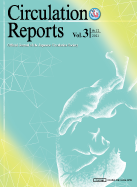Volume 3, Issue 12
Displaying 1-13 of 13 articles from this issue
- |<
- <
- 1
- >
- >|
Original Articles
Arrhythmia/Electrophysiology
-
Article type: ORIGINAL ARTICLE
Subject area: Arrhythmia/Electrophysiology
2021Volume 3Issue 12 Pages 691-698
Published: December 10, 2021
Released on J-STAGE: December 10, 2021
Advance online publication: November 09, 2021Download PDF (912K) Full view HTML
Cardiovascular Intervention
-
Article type: ORIGINAL ARTICLE
Subject area: Cardiovascular Intervention
2021Volume 3Issue 12 Pages 699-706
Published: December 10, 2021
Released on J-STAGE: December 10, 2021
Advance online publication: November 05, 2021Download PDF (825K) Full view HTML
Critical Care
-
Article type: ORIGINAL ARTICLE
Subject area: Critical Care
2021Volume 3Issue 12 Pages 707-715
Published: December 10, 2021
Released on J-STAGE: December 10, 2021
Advance online publication: October 27, 2021Download PDF (920K) Full view HTML
Imaging
-
Article type: ORIGINAL ARTICLE
Subject area: Imaging
2021Volume 3Issue 12 Pages 716-723
Published: December 10, 2021
Released on J-STAGE: December 10, 2021
Advance online publication: October 29, 2021Download PDF (1770K) Full view HTML
Myocardial Disease
-
Article type: ORIGINAL ARTICLE
Subject area: Myocardial Disease
2021Volume 3Issue 12 Pages 724-732
Published: December 10, 2021
Released on J-STAGE: December 10, 2021
Advance online publication: November 06, 2021Download PDF (1440K) Full view HTML
Statements / Opinions
-
Article type: STATEMENT / OPINION
2021Volume 3Issue 12 Pages 733-736
Published: December 10, 2021
Released on J-STAGE: December 10, 2021
Advance online publication: October 29, 2021Download PDF (567K) Full view HTML
Protocol Papers
-
Article type: PROTOCOL PAPER
2021Volume 3Issue 12 Pages 737-741
Published: December 10, 2021
Released on J-STAGE: December 10, 2021
Advance online publication: October 20, 2021Download PDF (601K) Full view HTML
Images in Cardiovascular Medicine
-
Article type: IMAGES IN CARDIOVASCULAR MEDICINE
2021Volume 3Issue 12 Pages 742-743
Published: December 10, 2021
Released on J-STAGE: December 10, 2021
Advance online publication: October 22, 2021Download PDF (815K) Full view HTML -
Article type: IMAGES IN CARDIOVASCULAR MEDICINE
2021Volume 3Issue 12 Pages 744-745
Published: December 10, 2021
Released on J-STAGE: December 10, 2021
Advance online publication: November 10, 2021Download PDF (697K) Full view HTML -
Article type: IMAGES IN CARDIOVASCULAR MEDICINE
2021Volume 3Issue 12 Pages 746-747
Published: December 10, 2021
Released on J-STAGE: December 10, 2021
Advance online publication: November 06, 2021Download PDF (714K) Full view HTML
Letters to the Editor
-
Article type: LETTER TO THE EDITOR
2021Volume 3Issue 12 Pages 748-
Published: December 10, 2021
Released on J-STAGE: December 10, 2021
Advance online publication: November 11, 2021Download PDF (300K) Full view HTML -
Article type: AUTHOR’S REPLY
2021Volume 3Issue 12 Pages 749-750
Published: December 10, 2021
Released on J-STAGE: December 10, 2021
Advance online publication: November 11, 2021Download PDF (319K) Full view HTML
-
2021Volume 3Issue 12 Pages Content12-
Published: December 10, 2021
Released on J-STAGE: December 10, 2021
Download PDF (659K)
- |<
- <
- 1
- >
- >|
